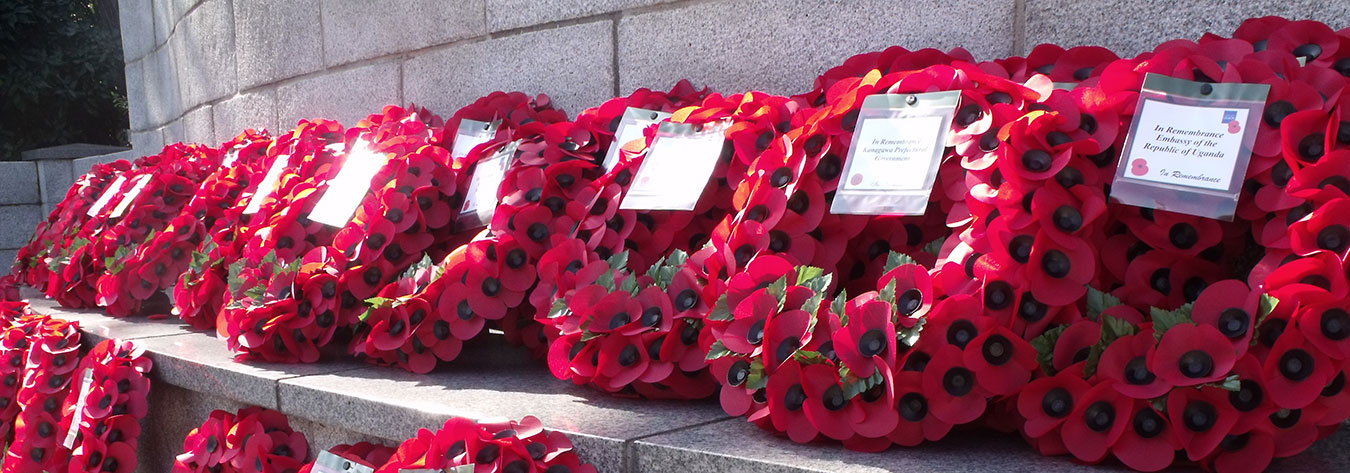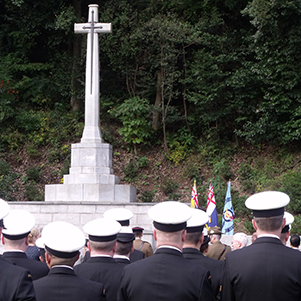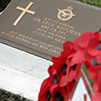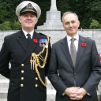One hundred years on from the opening of the Battle of the Somme—the 57,470 British Empire casualties on the first day make 1 July, 1916, the bloodiest day in the British Army’s history—representatives of Commonwealth embassies, schools, associations and organisations gathered to pay their respects at the Commonwealth War Cemetery in the Hodogaya district of Yokohama.
The only annual Remembrance Day ceremony in Japan was held on 13 November, the closest Sunday to the 11th hour of the 11th day of the 11th month, and almost a century after the guns on the Western Front finally fell silent. Member nations of the Commonwealth take turns to conduct the Remembrance Sunday event in Yokohama, with this year’s service organised by the British Embassy Tokyo.
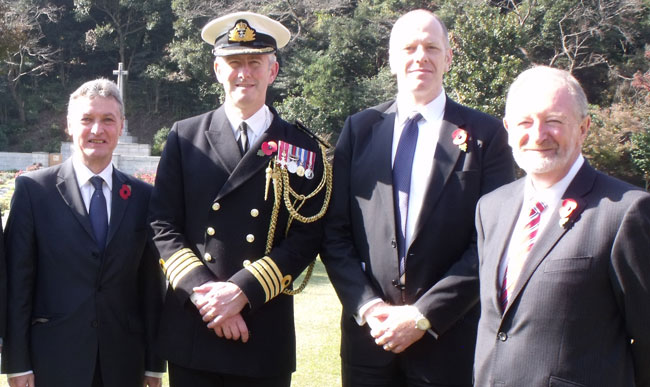
Steve Trevellick (left), head of corporate communications, Cornes Technologies; Royal Navy Captain Paul Casson, defence attaché, British Embassy Tokyo; David Bickle, BCCJ president; and Brian Christian, principal, British School in Tokyo, attended the ceremony.
Commander Donald Crosbie of the Royal Navy served as master of ceremonies and welcomed the guests to “this beautiful, solemn and peaceful place”. Representatives of four religions delivered commemorative observances, led by the Reverend Canon Andrew Dangerfield.
Royal Navy Capt. Paul Casson, the new defence attaché at the British Embassy Tokyo, then read the powerful poem In Flanders Fields, written by Canadian poet and physician John McCrae, who died of pneumonia in France before World War I ended.
Laurence Binyon’s equally moving They Shall Grow Not Old was then read by British Ambassador to Japan Tim Hitchens CMG LVO, followed by the crisp notes of the bugler’s Last Post and two minutes’ silence. Scottish-born Frank Hunter then played bagpipes, including Amazing Grace, while representatives of 24 embassies placed their wreaths, followed by dignitaries from Japan’s Ministry of Foreign Affairs and the Ministry of Defense, as well as other local associations.
With the conclusion of the official ceremony, heads of Commonwealth missions and other visitors moved to sections of the cemetery set aside for individual nations to pay their respects. Many lingered over the individual memorials bearing the personal details of the men remembered here, which often include a brief message from loved ones in distant Britain.
Private G.J. Gray, of the Middlesex Regiment, was 26 when he died on 2 January, 1943. On the bottom of the metal plaque where he is remembered is the message: “Someone thinks of you always and tries to be brave and content. Mother”. Not far away lies Private A.E. Lambeth of the Cambridgeshire Regiment, who was 30 when he died in September 1944. His epitaph reads: “Greater love hath no man than this. He laid down his life for his friends”.
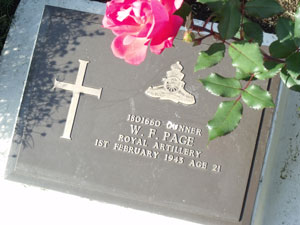 Six markers in one plot of the cemetery bear the always-poignant words, “A soldier of the 1939–1945 war. Known Unto God”.
Six markers in one plot of the cemetery bear the always-poignant words, “A soldier of the 1939–1945 war. Known Unto God”.
The cemetery contains 1,555 Commonwealth war burials and commemorations of World War II, including 53 who remain unidentified and a number of special memorials to casualties whose graves have not been located. It also has one grave from World War I, as well as 171 burials from after that war.
Two students from The British School in Tokyo were among those who laid a wreath before The Cross of Sacrifice, followed by two Cub Scouts from the school’s 1st Tokyo Scouts Group.
“For young people in the UK, Remembrance Sunday is an annual event that they are all very aware of”, said Brian Christian, principal of the school. “We have many members of the British community who send their children to our school and we believe it is very important that this day is relevant for us here as well.
“We share the values of this day and I feel it helps us to remain connected to our Britishness”, he told BCCJ ACUMEN.
“It’s important to commemorate those who have fallen on all sides in all wars—today, that is more important than ever—and we want to get our young people thinking about these situations and taking part in such a thoughtful occasion as this”, he said.
Remembrance is an important part of the curriculum at the school, Christian explained, with an assembly in the week before the ceremony dedicated to the significance of the day. And on the 11th hour of the 11th day of the 11th month, the entire school observed two minutes of silence.
